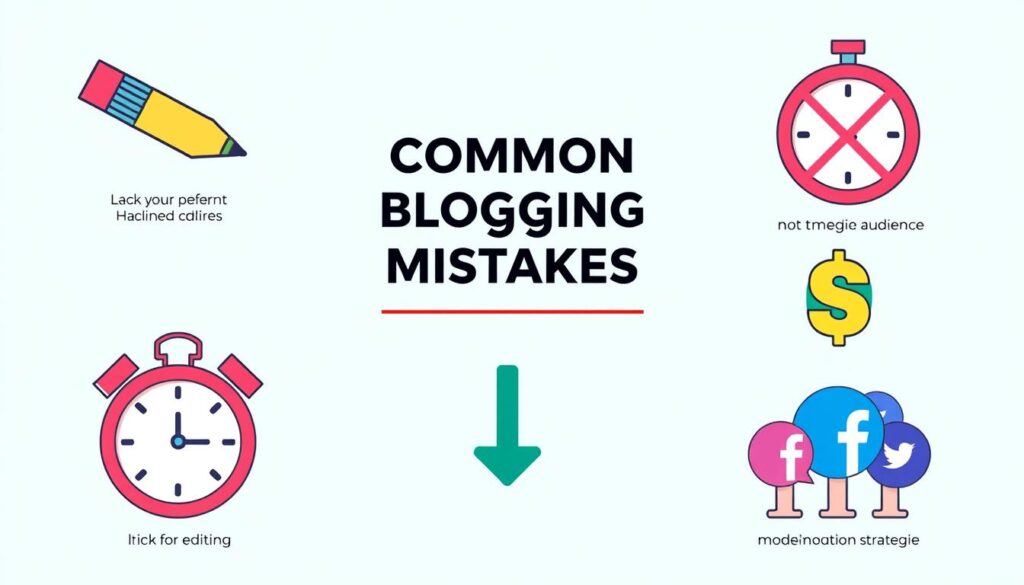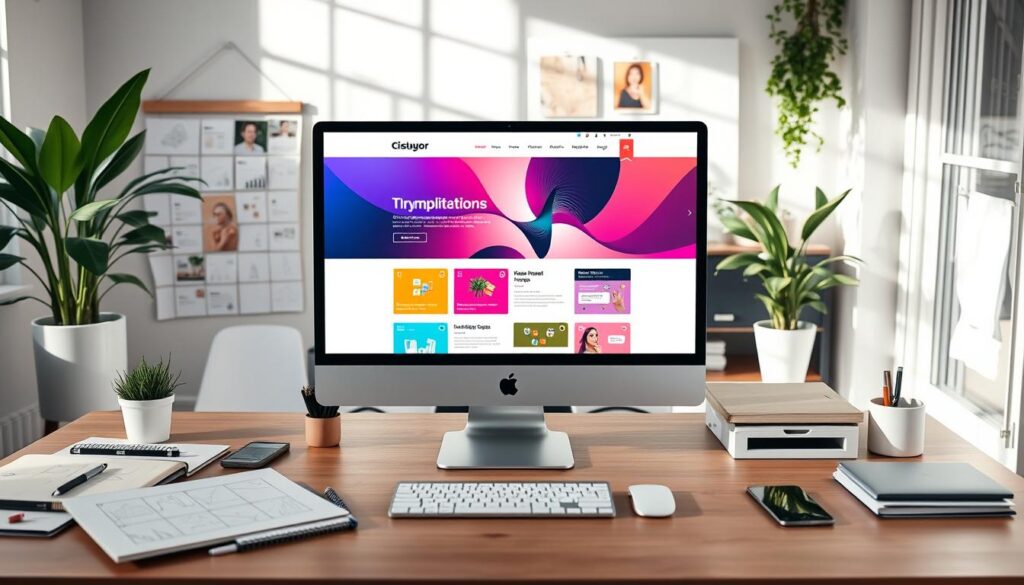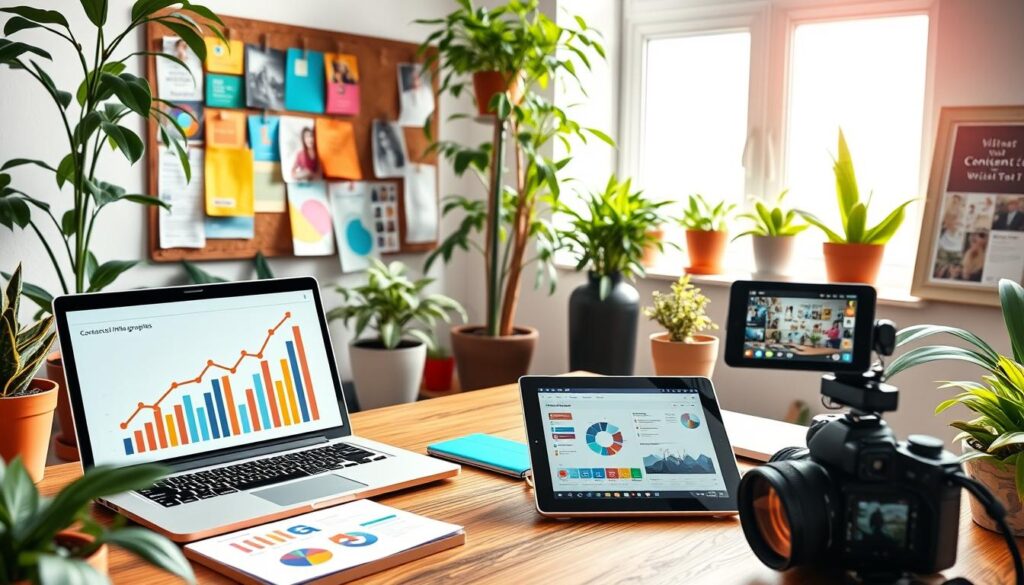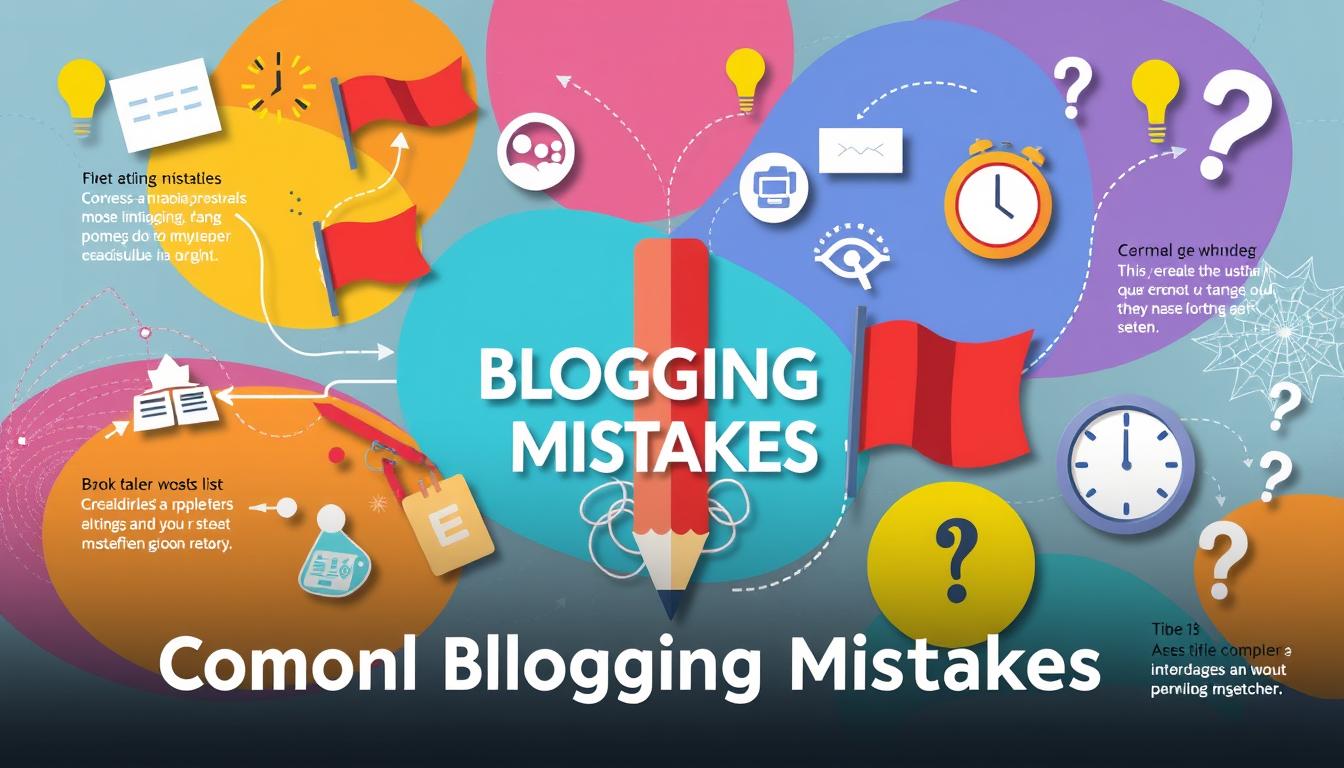In 2015, Sarah Martinez started her food blog with dreams and little planning. Her excitement soon turned to frustration as her blog didn’t get much traffic. She learned that just loving to blog wasn’t enough.
The world of 2025 is different. Blogging is now a serious skill that needs strategy. You can’t just post content; you need to know how to do it right.
Knowing what not to do is key. There are over 100 common mistakes bloggers make. To succeed, you need to be smart, flexible, and use data to guide you.
Key Takeaways
- Recognize and address common blogging mistakes before they derail your success
- Develop a strategic approach to content creation and SEO
- Understand that blogging is a long-term investment requiring continuous learning
- Focus on quality over quantity in your content strategy
- Embrace data-driven decision-making for blog growth
Understanding Content Quality and Creation Pitfalls

Creating high-quality content is a big challenge for bloggers and online publishers. The digital world needs more than just words. It needs content that is strategic, engaging, and valuable.
Content quality is key to success in online publishing. Bloggers know that shallow content can lose readers fast. It can also harm their brand’s reputation.
Impact of Poor Content Structure
Poor content structure hurts reader engagement and SEO. Readers scan content for clear, organized info. A messy blog post can lead to:
- Increased bounce rates
- Reduced reader comprehension
- Lower search engine rankings
- Diminished credibility
Problems with Generic Content
Generic content bores readers. 70% of marketers say a documented content strategy is key. Unique perspectives and authentic voice help you stand out online.
Issues with Content Depth
Shallow content is a big mistake. Research shows longer posts engage more and show expertise. Common mistakes include:
- Superficial topic coverage
- Lack of original insights
- Missing data and research
- Inadequate explanation of complex concepts
“Quality content is the best sales tool in the digital age.” – Marketing Insights Report
| Content Quality Metric | Impact |
|---|---|
| Unique Content | 97% More Backlinks |
| Regular Posting | 40% Increased Engagement |
| In-Depth Articles | 60% Higher Trust Ratings |
By focusing on quality and avoiding common mistakes, bloggers can create content that resonates. This content drives meaningful engagement with their audience.
Common Blogging Mistakes That Hurt Your Success

Blogging needs smart planning and knowing what to avoid. Mistakes can stop your blog from growing and reaching more people.
“Success in blogging isn’t about perfection, but about continuous improvement and learning from mistakes.”
Many bloggers make big mistakes that hurt their success:
- Inconsistent posting schedules that confuse readers
- Lack of clear niche focus
- Neglecting audience engagement
- Ignoring content quality standards
Knowing these mistakes is key to a strong blog. Successful bloggers know that strategic planning is better than posting randomly.
| Mistake | Impact | Solution |
|---|---|---|
| Irregular Posting | Decreased Reader Retention | Create Content Calendar |
| Broad Topic Selection | Reduced Audience Targeting | Define Specific Niche |
| Minimal Community Interaction | Lower Engagement Rates | Encourage Comments/Feedback |
Fixing these mistakes can change your blog for the better. You’ll make content that really speaks to your readers.
Critical SEO Optimization Errors
Search engine optimization is key for bloggers wanting to be seen online. Over 60% of marketers see how content optimization boosts website traffic. So, knowing SEO best practices is crucial.

Good SEO needs a wide approach that covers many areas. Bloggers often face problems that hurt their rankings.
Keyword Research Failures
Starting with solid keyword research is vital for SEO. Many bloggers make big mistakes that harm their strategy:
- Ignoring long-tail keywords, which make up over 70% of searches
- Only using high-competition primary keywords
- Not considering what users are searching for
“Understanding your audience’s search behavior is more important than chasing trending keywords.”
Technical SEO Mishaps
Technical SEO is key for a website’s performance. Common issues include:
- Slow loading speeds (40% of users leave if it takes over 3 seconds)
- Poor mobile optimization
- Bad internal linking
On-Page SEO Mistakes
On-page SEO needs careful attention. Common errors include:
- Keyword stuffing, which can lower rankings by 30%
- Poor meta descriptions
- Missing or irrelevant alt text for images
By fixing these SEO problems, bloggers can boost their site’s visibility and user interest.
Content Strategy and Planning Issues

Creating a good content strategy is a big challenge for bloggers and marketers. 55% of content creators lack a formal strategy. This makes it hard for them to engage their audience well.
To make a strong content marketing plan, you need to plan carefully. Focus on:
- Understanding audience demographics
- Creating a comprehensive editorial calendar
- Diversifying content types
- Aligning content with audience needs
“70% of marketers say that understanding their audience is crucial for developing effective content strategies.” – Digital Marketing Insights
Good content planning is more than just posting things randomly. Companies with smart content plans see big benefits:
| Strategy Element | Potential Impact |
|---|---|
| Documented Content Strategy | 313% Higher Success Rate |
| Consistent Publishing | 55% Increase in Website Visitors |
| Audience-Tailored Content | 70% Improvement in Brand Awareness |
Common mistakes include posting without a plan, not knowing the audience, and not checking how well content does. Using a detailed editorial calendar can help avoid these mistakes. It helps keep your blog on track and engages your audience better.
Businesses should focus on making evergreen content. This type of content keeps attracting visitors and helps with SEO over time.
Website Design and User Experience Blunders
Your blog’s design is like your digital face. First impressions are key. Studies show 94% of first impressions are about design. Users decide about a website in just 50 milliseconds.

Creating a great blog design is more than just looks. User experience includes many important parts. These parts can make or break your website’s success.
Navigation Challenges
Good website navigation keeps visitors interested. Here are some tips:
- Create intuitive menu structures
- Implement clear, descriptive link labels
- Ensure users can find information within three clicks
- Use consistent navigation across all pages
Mobile Optimization Mistakes
Mobile traffic is huge, so mobile optimization is essential. Google values mobile-friendliness a lot. Responsive design makes your blog look good on all devices.
Site Speed Performance
Site speed affects user experience and search rankings. Slow sites annoy users and increase bounce rates. Improve your blog’s speed by:
- Compressing images
- Minimizing HTTP requests
- Utilizing content delivery networks (CDNs)
- Implementing caching strategies
“A well-designed website can boost online traffic and engagement by creating a seamless user experience.”
Focus on blog design, user experience, navigation, mobile optimization, and site speed. This will make your digital platform attractive and keep readers coming back.
Monetization and Business Strategy Failures

Many content creators find it hard to make money from their blogs. They often implement monetization strategies without knowing what their audience wants. The secret to making money from a blog is to plan well and know your audience.
Starting a blog can lead to mistakes that stop you from making money. New bloggers often make big mistakes that block their path to success:
- Depend too much on one way to make money
- Try to make money too fast without enough readers
- Don’t listen to what their audience likes
- Don’t have a solid plan for their business
“Success in blogging comes from understanding your audience and providing genuine value.” – Digital Marketing Expert
Having different ways to make money is key to lasting success. Good monetization strategies might include:
- Affiliate marketing
- Sponsored content
- Digital product creation
- Consulting services
Studies show that 72% of new business ideas don’t make enough money. This shows how important it is to plan well in your business strategy. By focusing on what your audience wants and creating different ways to make money, bloggers can build a strong and profitable online business.
Remember, making money from a blog isn’t just about selling things. It’s about giving real value to your readers. Start small, get to know your audience, and slowly build your income streams with smart blog monetization strategies.
Building and Engaging Your Audience
To create a lively online community, you need to engage your audience well. Successful bloggers know that it’s not just about posting content. They also focus on building a community and using social media wisely.

- 70% of readers abandon blogs without a personal connection
- Engaging with audience feedback increases community building by 60%
- Unique content drives 90% higher engagement rates
Community Building Mistakes
Bloggers often don’t realize how important real interaction is. They make mistakes like:
- Neglecting reader comments
- Failing to develop a consistent communication strategy
- Ignoring audience demographics and preferences
Social Media Engagement Errors
Good social media marketing needs careful planning. Bloggers should avoid posting the same thing over and over. They should aim to make real connections instead.
| Engagement Strategy | Impact |
|---|---|
| Personalized Content | 50% Higher Retention |
| Regular Interaction | 65% Increased Loyalty |
| Multimedia Integration | 94% Enhanced Viewer Engagement |
“Authentic connection trumps algorithm-driven content every time.” – Digital Marketing Expert
By using the right engagement strategies, bloggers can turn casual readers into a dedicated community.
Content Promotion and Distribution Errors

Creating great content is just the start. Successful blog marketing also means smart content promotion and distribution. Many creators make big mistakes that limit their content’s reach and impact.
The biggest error is ignoring distribution. Effective promotion tactics need careful planning and action.
“Without a clear understanding of the target audience, content may not resonate effectively”
To avoid common mistakes, focus on:
- Diversifying content channels to maximize visibility
- Developing a consistent promotional schedule
- Understanding audience preferences for content consumption
- Tracking performance metrics systematically
Here are some shocking stats about content distribution:
- Nearly 50% of published content receives eight social media shares or less
- Only 26% of marketers invest seriously in content distribution
- Brands using 3-5 distribution channels report 40% higher audience engagement
Successful content promotion needs smart thinking. Brands that target their audience well see up to 39% higher conversion rates. It’s not just about creating content. It’s about making sure it reaches and connects with the right people.
Technical and Security Oversights
Keeping your blog safe is more than just posting great content. Bloggers today must focus on website upkeep and security. This is to avoid disasters that could harm their online presence.

Cyber threats are growing fast. Recent numbers show how important digital security is:
- 50% of IT leaders worry most about data leakage with AI
- Nearly 75% of companies are setting up AI governance teams
- Almost 70% of cybersecurity teams are handling AI risks
Critical Data Backup Strategies
WordPress updates and regular backups are key to a safe blog. Ignoring these steps can cause huge data loss. A good backup plan includes:
- Setting up regular automated backups
- Keeping backups on different platforms
- Checking if you can restore data
Website Maintenance Best Practices
Technical problems can pop up anytime. Keeping your site up to date helps avoid security risks. Important steps include:
- Doing monthly security checks
- Updating WordPress, themes, and plugins fast
- Using strong, unique passwords
- Installing good security plugins
“You’re only as secure as your weakest link” – Cybersecurity Experts
By focusing on blog security and regular site upkeep, you’ll build a strong online space. This protects your content and readers.
Visual Content and Multimedia Mistakes
Creating eye-catching visual content is key to grabbing people’s attention online. Instagram leads Twitter in mobile traffic, and Facebook sees 53% more engagement with images. This shows how vital multimedia is.

Bloggers often make mistakes with visual content. The main errors include:
- Using low-resolution images that look blurry
- Putting too much text on visuals
- Not optimizing images for search engines
- Not matching visuals with the brand’s message
Optimizing images is a smart move. Experts suggest using top-notch resources like HubSpot’s 550 royalty-free stock photos. Visual content should be clear and professional.
“80% of consumers are more likely to engage with a brand after watching a video” – Marketing Research Insights
| Visual Content Type | Engagement Rate | Best Practices |
|---|---|---|
| Infographics | 300% increase | Clear design, minimal text |
| Video Content | 130% more clicks | Short, targeted messaging |
| Social Media Images | 53% more likes | High resolution, trend-aligned |
Video content is another important strategy. With mobile video use doubling every year, it’s set to be the main internet traffic. Bloggers need to focus on adding videos to their plans.
Good visual content management can cut down on searching for assets by 40%. It also makes content delivery much more efficient. By avoiding common mistakes, bloggers can make their content more engaging, professional, and shareable.
Legal and Ethical Considerations

Blogging ethics require careful attention to legal rules and professional standards. Content creators must protect intellectual property and respect legal limits.
Key legal considerations for bloggers include:
- Copyright issues and proper content attribution
- Disclosure requirements for sponsored content
- Privacy policies and data protection
- Ethical content creation practices
Copyright infringement is a big risk for bloggers. Research shows that about 60% of bloggers use stock photography without proper licensing. To stay safe, always:
- Get explicit permission for content use
- Use stock photo sites with clear reuse licenses
- Create original content whenever possible
- Provide proper attribution for referenced materials
Digital responsibility isn’t just about avoiding legal trouble—it’s about maintaining professional integrity and reader trust.
Privacy policies are key for legal blogging. About 70% of online users expect clear privacy policies. Having clear guidelines shows respect for your audience and builds trust.
Sponsored content and affiliate marketing need extra care. Being transparent is crucial—about 73% of readers trust bloggers more when they clearly state sponsorship.
By focusing on blogging ethics and legal rules, creators can protect themselves and build a good online reputation.
Time Management and Productivity Issues

Blogging success depends on good time management and smart productivity tips. Almost 70% of workers struggle with setting clear goals. This affects their content creation and publishing plans.
For bloggers, mastering time management is key to doing better. Distractions and bad planning can mess up your creative flow and growth.
Navigating Publishing Schedule Challenges
Creating content regularly needs a solid publishing plan. Important strategies include:
- Create a realistic content calendar
- Set specific writing time blocks
- Prioritize tasks using the Eisenhower matrix
- Implement productivity tracking tools
“The key is not to prioritize what’s on your schedule, but to schedule your priorities.” – Stephen Covey
Overcoming Content Planning Failures
Good content planning is more than just scheduling. A huge 88% of professionals say not having a clear to-do list causes stress and lowers productivity.
To boost your blogging, try these tips:
- Break big projects into smaller tasks
- Use time-tracking apps
- Stay focused by avoiding multitasking
- Take smart breaks to keep your energy up
Pro tip: Taking short breaks can boost productivity by up to 25%. So, make sure to take breaks to keep your creativity and output strong.
Brand Building and Professional Growth
Creating a strong personal brand is key for bloggers aiming for success. It’s not just about making content. It’s about building a unique identity that speaks to your audience.
“Your brand is what people say about you when you’re not in the room.” – Jeff Bezos
Personal branding is complex. But, with the right strategies, you can grow your blog and network effectively. Here are some important tips:
- Develop a consistent visual and messaging style
- Create authentic content that reflects your expertise
- Leverage influencer collaborations to expand reach
- Invest time in professional skill development
Here are some interesting facts about building a brand:
| Brand Strategy | Impact |
|---|---|
| Consistent Brand Experience | 23% Average Revenue Increase |
| Emotional Connection | 64% Consumer Preference |
| Adaptation to Trends | 88% Positive Consumer Perception |
Networking is crucial for growth. Connecting with industry professionals can open doors and boost your career.
Building a brand takes time, usually 1-2 years. Be patient, stay true to yourself, and keep improving your branding strategy.
Conclusion
To succeed in blogging, you need a smart plan to avoid mistakes and keep getting better. The world of 2025 wants more than just content—it wants experiences that connect with people. By following the best blogging practices, you can turn mistakes into chances to grow and connect with your audience.
Creating a blog isn’t about being perfect; it’s about learning and changing. Studies show that blogs can boost website traffic by 55% and increase returns by up to 13 times. This shows how powerful smart content marketing can be.
Your blogging path is special, and learning from this guide will help you in the digital world. Every problem is a chance to get better, know your audience more, and have a stronger online presence. Stay curious, flexible, and focused on sharing real value through your content.
As you go on, aim to make content that’s real, well-researched, and grabs your readers’ attention. The best bloggers see their blogs as places for connection and sharing. Your drive to improve will set you apart in the digital content world.

